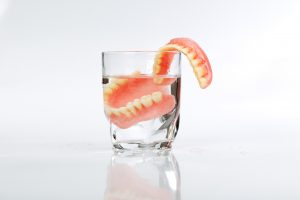
At the beginning of the study, 524 randomly selected seniors were examined for oral health status and oral hygiene behaviors, and were subject to a medical assessment. Over the three-year follow-up period, 48 medical events were associated with pneumonia. Of the 453 individuals using dentures, 186 wore them during sleep and were found to be at the highest risk for pneumonia, compared to those who took dentures out for the night.
The researchers noted that swallowing difficulties and overnight denture wearing increased the risk of pneumonia by 2.3 times, which is similar to mild cognitive impairments, history of stroke, and respiratory disease. Those who wore dentures overnight were also at a higher risk for tongue and gum plaque, gum inflammation, Candida albicans (yeast infection), and higher levels of circulating interleukin-6 (a pro-inflammatory agent), compared to their counterparts.
Not only is wearing dentures overnight associated with oral inflammatory and microbial burden, but it can also increase the risk of pneumonia.
Related: Is Pneumonia Contagious?
Sleeping in dentures can cause health problems
Aside from an increased risk of pneumonia, sleeping in dentures is also associated with a number of other health problems. For starters, wearing dentures overnight puts added stress and pressure on the gums, causing gradual decrease in bone density beneath the gums. Furthermore, if dentures are not properly cared for, they can turn into a breeding ground for bacteria, increases the risk of serious infections.
Continuous nighttime denture wear can also lead to stomatitis, where the tissue beneath the gums becomes affected. This area can become inflamed, reddened, and infected with yeast.
As you can see, there are numerous risks associated with wearing your dentures overnight, and so it is advised that you remove them and clean them properly to lower your risk of complications.
Tips to take care of dentures
Even if you don’t sleep in your dentures, you are still at risk for infection if you do not properly care for them. Here are some tips to properly care for dentures.
- Remove and rinse dentures after eating.
- Brush your dentures at least once a day – twice is optimal – with a soft toothbrush and denture cleanser. Using a fizzing agent to clean them isn’t as effective for plaque removal as brushing.
- Store your dentures in water or an alkaline peroxide-based solution.
- Brush your gums and tongue every day.
- Rinse you dentures before putting them back in your mouth.
- Pay attention to any changes in fit, because improperly fitting dentures increases the risk of infection, as bacteria and food can slip between the cracks.
- Handle dentures with care.
By following these tips, you can reduce your risk of oral complications.
Related Reading:
Influenza (flu) vs. pneumonia, differences in symptoms, causes, and treatment
Influenza (flu) and pneumonia at first glance may appear the same, but there are distinct differences between the two along with different treatment methods that need to be considered in order to get over either illness. Continue reading…
Pneumonia risk varies with vitamin D and E levels, smoking, and exercise
Pneumonia risk varies with vitamin D and E levels, smoking, and exercise. The findings come from researchers at the University of Finland who uncovered that low vitamin D serum levels are a risk factor for pneumonia. The researchers found that the risk of contracting pneumonia was 2.5 times greater in individuals with low vitamin D levels. Continue reading…
Sources:
http://www.eurekalert.org/pub_releases/2014-10/iaa-sid100714.php
http://www.deardoctor.com/inside-the-magazine/issue-30/sleeping-in-dentures/
http://www.besthealthmag.ca/best-you/oral-health/7-rules-for-denture-care/